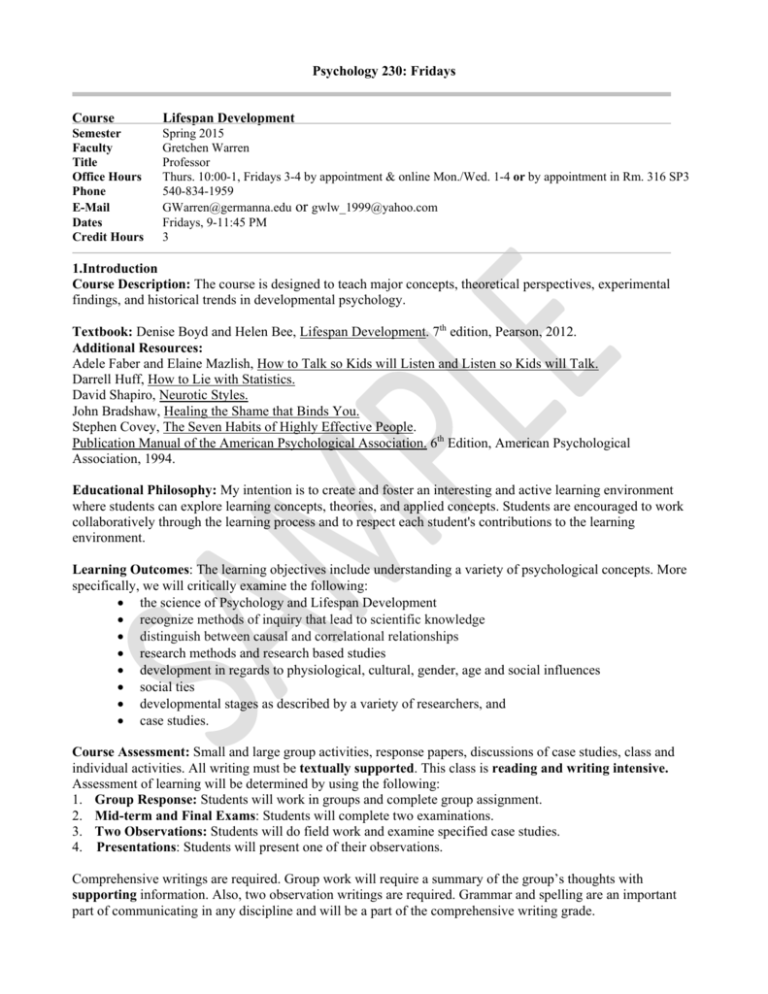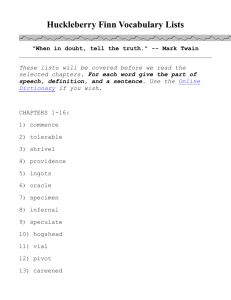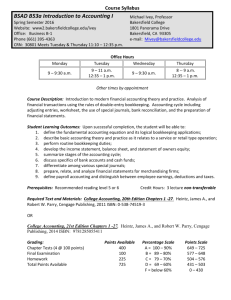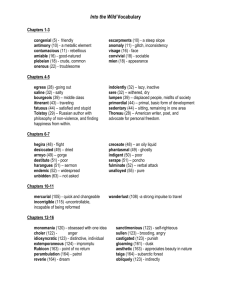Psychology 230: Fridays Course Lifespan Development 1
advertisement

Psychology 230: Fridays Course Lifespan Development Semester Faculty Title Office Hours Phone E-Mail Dates Credit Hours Spring 2015 Gretchen Warren Professor Thurs. 10:00-1, Fridays 3-4 by appointment & online Mon./Wed. 1-4 or by appointment in Rm. 316 SP3 540-834-1959 GWarren@germanna.edu or gwlw_1999@yahoo.com Fridays, 9-11:45 PM 3 1.Introduction Course Description: The course is designed to teach major concepts, theoretical perspectives, experimental findings, and historical trends in developmental psychology. Textbook: Denise Boyd and Helen Bee, Lifespan Development. 7th edition, Pearson, 2012. Additional Resources: Adele Faber and Elaine Mazlish, How to Talk so Kids will Listen and Listen so Kids will Talk. Darrell Huff, How to Lie with Statistics. David Shapiro, Neurotic Styles. John Bradshaw, Healing the Shame that Binds You. Stephen Covey, The Seven Habits of Highly Effective People. Publication Manual of the American Psychological Association. 6th Edition, American Psychological Association, 1994. Educational Philosophy: My intention is to create and foster an interesting and active learning environment where students can explore learning concepts, theories, and applied concepts. Students are encouraged to work collaboratively through the learning process and to respect each student's contributions to the learning environment. Learning Outcomes: The learning objectives include understanding a variety of psychological concepts. More specifically, we will critically examine the following: the science of Psychology and Lifespan Development recognize methods of inquiry that lead to scientific knowledge distinguish between causal and correlational relationships research methods and research based studies development in regards to physiological, cultural, gender, age and social influences social ties developmental stages as described by a variety of researchers, and case studies. Course Assessment: Small and large group activities, response papers, discussions of case studies, class and individual activities. All writing must be textually supported. This class is reading and writing intensive. Assessment of learning will be determined by using the following: 1. Group Response: Students will work in groups and complete group assignment. 2. Mid-term and Final Exams: Students will complete two examinations. 3. Two Observations: Students will do field work and examine specified case studies. 4. Presentations: Students will present one of their observations. Comprehensive writings are required. Group work will require a summary of the group’s thoughts with supporting information. Also, two observation writings are required. Grammar and spelling are an important part of communicating in any discipline and will be a part of the comprehensive writing grade. Group Response papers are two-fold; individual discussion board entries and a group paper to be turned in via a hard copy in class will constitute your grade. Your group is encouraged to experiment with what you have read and learned specifically from the concepts, ideas, and/or objectives from the week’s reading assignments. Your group is also encouraged to research what you have learned from the textbook and in class. Please consider using time outside of class to organize with your group. Group assignments will be done randomly and change with each response. The directions are as follows: Our Discussion Board will facilitate the week-long group work. The group will discuss the topic in class and via Discussion Board. Your discussion board entry must be a scholarly paragraph, well written, and must include at least one properly cited reference. As a group, write a 2-3 page paper answering the groups’ question. Make sure to include at least one source to support the groups’ work (the text book is fine, .org and/or .edu). Important for the final group paper: Remember to answer the question completely, support your answer, offer a “group voice,” and then expand/apply to real-life (critical thinking by applying knowledge to real-life situations). The individual discussion board entries and a group paper constitute 2 parts of the Group Response assignment. Both parts must be completed to receive a grade. These are 25% of your grade. Two observational writings are required. They should be typed, 12 pitch and 2 full pages (no more, no less). A hard copy must be turned in on the day due. Another digital copy must be uploaded to Safe Assign on the day due. Both observational writings should include an introduction, discussion, analysis, and a conclusion. We will discuss the exact layout expected during class. The purpose of the observational writings is to encourage you to examine psychology objectively. Each of the observational writings will count for 10% of the term grade. On one of last few days of class, you will present one of your observational writings. The presentation should be at least 3 minutes and no more than 8 minutes (the presentations are timed and part of the grade will reflect the 3-8 minute window). The presentation will count for 15% of the term grade. If there is an area you would like to research, you must get prior permission from the professor. The research must be a. practical, b. based on data, and c. developmentally-oriented. There will be two exams. Each exam will count for 15% of the term grade. Class attendance and participation are essential. Students are required to read all assignments prior to class and be prepared to discuss and apply the material during class discussions, activities, and exercises. Class attendance and participation will count for 10% of the term grade. Extra Credit: Throughout the course there will be opportunities for extra-credit. In the past, students have been offered a variety of choices. The choices depend on classroom & text discussions. The credit will be added to the mid-term or the final exam grade. Grading: Test scores, written assignments, class participation, and a presentation will determine grades. All written work will be graded for proper grammar and spelling as well as content and a show of critical thinking. The writing assignment should follow a standard APA format, unless otherwise discussed in class. All work must be hand delivered to the instructor unless special arrangements are made prior to the submission date. No late work will be accepted. Final breakdown of the grade is as follows: Midterm Exam Final Exam Group Responses Observations Presentation Class Participation Total 15% 15% 25% 20% 15% 10% 100% The midterm exam will cover all assigned readings and class discussion for Chapters 1-10. The final exam will be cumulative and take-home. The following will be used to assign course letter grades: 90-100 A 80-89 B 70-79 C 60-69 D 0-59 F (or two or more unexcused absences) Making Up a Missed Exam: Only extraordinary circumstances warrant a student being allowed to make up an exam. It is the student’s responsibility to contact the instructor before the scheduled exam. In the process of determining whether a make-up exam should be allowed, the burden of proof is on the student. The instructor has the right to request verification of any excuse offered by the student. Late Submission of Course Materials: If an assignment is due on a day that the student is not present, it is the student's responsibility to get the assignment to the instructor on the due date. No late work will be accepted. Schedule: Our class schedule will be up-dated as needed. The syllabus may change over the course of the semester. Classroom Rules of Conduct: Class participation is expected and will form a part of the final grade. Students are expected to attend all classes and be on time. Students are required to read all material assigned prior to class and apply the material during class discussions, activities, and exercises. The student is responsible for providing the instructor with justification for an excused absence, either prior to or immediately after the absence. Cell phones are now an integral part of our modern-day experience. However, cell phone use is prohibited in the classroom. Before coming to class, put cell phones on “Silent” or turn them off for the duration of class. Students must be responsible for planning ahead and meeting deadlines. Students will conduct themselves in a professional manner at all times. Students are expected to respect other students' opinions and values, even if they disagree with those opinions and values. There should only be one person talking at a time. Side bar conversations will not be tolerated. II. Communicating with the Instructor Office hours are posted on page 1 of this syllabus. Emailing is acceptable. If you would like to schedule a time to meet with the instructor, please email and offer two or three options. With each email, put the course and meeting day in the email’s subject line. GCC policy gives the instructor 48 hours to respond back. For this class, the response time may be less. III. College Information and Class Policy Important Dates Classes Begin Last Day to Add MLK Day (College Closed) Last Day to Drop with Refund College Learning Day (No Classes) Student Success Day Last Day to Withdraw Without Academic Penalty Jan 12 Jan 17 Jan 19 Jan 29 Feb 10 Mar 11 Mar 23 Spring Break Mar 16-22 (No Classes) Classes End Final Examinations Mar 16-22 May 6 May 7-13 Course Plan for College Closing: When the college’s closing impacts our class time, the instructor will send out an email with instructions. Please make sure to check your GCC email regularly. Academic Honesty: Academic integrity is the foundation of the academic community. Because each student has the primary responsibility for being academically honest, students are advised to read and understand all sections of this policy relating to standards of conduct and academic life. Plagiarism: Plagiarism involves the use of quotations without quotation marks, the use of quotations without indication of the source, the use of another's idea without acknowledging the source, the submission of a , laboratory report, project, or class assignment (any portion of such) prepared by another person, or incorrect paraphrasing. Attendance Policy: Instructors are required to maintain attendance records and to report absences via the online attendance reporting system. 1. The instructor may excuse absences for valid reasons, but missed work must be made up within the semester/term of enrollment. 2. Work missed through unexcused absences must also be made up within the semester/term of enrollment, but unexcused absences may carry further penalties. 3. In the event of three consecutive unexcused absences in a semester/term of enrollment, the student will receive a failing grade. 4. An “Incomplete" will not be issued to a student who has unexcused or excessive absences recorded for a course. IV. Tentative Course Activities and Assignments Course Topic/Dates/Assignments: Dates Week 1 January 16 Week 2 January 23 Week 3 January 30 Chapters In-class Activities Introductions, Schedule, and Video Assignment: Chapters 1& 2 Finish “In the Womb” Discuss Chapters 1&2 Discuss Chapters 3& 4 Observation Q/A Exams and Assignments Due for next class Assignment: Chapters 3 & 4 Group Response: Group 1) p. 9 Critical Analysis #2, Group 2) p. 28 Critical Thinking # 3, Group 3) p.44 Critical Thinking #4, Group 4) p. 78 Critical Thinking # 5, Group 5) “Should pregnant women who use illicit drugs be prosecuted?" Group 6) p.102 Critical Thinking # 3 Group Response and Paper: Group 1) p. 9 Critical Analysis #2, Group 2) p. 28 Critical Thinking # 3, Group 3) p.44 Critical Thinking #4, Group 4) p. 78 Critical Thinking # 5, Group 5) “Should pregnant women Chapters 5 & 6 who use illicit drugs be prosecuted?" Group 6) p.102 Critical Thinking # 3 Week 4 February 6 Chapters 5 & 6 Week 5 February 13 First Observational No Class Week 6 February 20 First Observation due today (Hard copy in class and Safe Assign) Chapters 7 & 8 Group Response : Group 1) p.166 Critical Thinking #5, Group 2) p.175 You Decide, Group 3) p. 201,You Decide Group 4) p. 207 Critical Thinking #5. Group 5) Are child support policies fair to noncustodial fathers? Group 6) Describe Bronfenbrenner’s theory on the Ecological Model. Then from your group’s discussion, apply the theory to at least one “real life example. Assignment: Chapters 9 & 10 Study for Mid-Term Week 7 February 27 Chapters 9 &10 Assignment: Chapters 9 & 10 Study for Mid-Term Study for Mid-term Exam: Oct. 10 Mid-Term Exam Assignment: Chapters 11 & 12 Group Response : Group 1) p.291 Critical Thinking #4, Group 2) p. 271 Critical Thinking #5, Group 3) p. 298 Critical Analysis #1 &2, Group 4) p.311 You Decide Group 5) p. 317 Critical Thinking Group 6) Should marijuana be legalized in the US for 18 year olds? Why or why not? Week 8 March 6 Mid-Term Exam Week 9 March 13 Assignment: Chapters 7 & 8 Group Response : Group 1) p.166 Critical Thinking #5, Group 2) p.175 You Decide, Group 3) p. 201,You Decide Group 4) p. 207 Critical Thinking #5. Group 5) Are child support policies fair to noncustodial fathers? Group 6) Describe Bronfenbrenner’s theory on the Ecological Model. Then from your group’s discussion, apply the theory to at least one “real life example.” Assignment: Chapter 9 &10 First Observational Assignment: Observe a child around 24 months of age and his/ her parent/guardian interacting. Try to refrain from being an active participant. Make notes (mental or physical about the conversation). From the interaction you observed, how do you describe each person’s involvement? Be specific and use examples. Now describe at least 2 parts or “moments in time” when the interaction seemed particularly interesting. How would theoretical perspectives fit the situation you observed? Sign-up to meet with instructor for 2nd half of class next week Group Response : Group 1) p.291 Critical Thinking #4, Group 2) p. 271 Critical Thinking #5, Group 3) p. 298 Critical Analysis #1 &2, Group 4) p.311 You Decide Group 5) p. 317 Critical Thinking Group 6) Should marijuana be legalized in the US for 18 year olds? Why or why not? Instructor/Student Meetings 2nd half of class (2nd Observation Topic) Week 10 March 20 Spring Break No class Group Response : Week 11 March 27 Chapters 11 &12 Week 12 April 3 No class No class Week 13 April 10 Chapters 13 &14 Group Response : Group 1) p. 327 You Decide Group 2) p. 328,Critical Thinking #4, Group 3) p. 330 Reflection, Group 4) p.355 You Decide, Group 5) p. 361, Critical Thinking, Group 6) p.382, Critical Thinking #5. Assignment: Chapter 15 & 16 Week 14 April 17 No Class No Class Discussion Board Discussion Board Observation #2 Due next week (Hard copy Week 15 April 24 2nd Observation Chapters 15 & 16 Case Study Week 16 May 1 Finish Chapters Nun Study Case study Pick up Final Exam/ Case Studies Presentations Begin Prepare for Presentations Week 17 May 8 Final Exam Due Finish Presentations Have a fun & safe summer! Group 1) p.291 Critical Thinking #4, Group 2) p. 271 Critical Thinking #5, Group 3) p. 298 Critical Analysis #1 &2, Group 4) p.311 You Decide Group 5) p. 317 Critical Thinking Group 6) Should marijuana be legalized in the US for 18 year olds? Why or why not? Assignment: Chapters 13 & 14 Assignment: Chapters 13 &14 Group Response : Group 1) p. 327 You Decide Group 2) p. 328,Critical Thinking #4, Group 3) p. 330 Reflection, Group 4) p.355 You Decide, Group 5) p. 361, Critical Thinking, Group 6) p.382, Critical Thinking #5. Second Observational Assignment: In either, consider gender, age, cultural background and social ties. Choose one of the following 1) 1) Interview a person at least 70, one at least 40, one at least 30 and one 18 to 25. Explore each person’s view of aging, 2) 1) Interview a person at least 70, one at least 40, one at least 30 and one 18 to 25.. Explore each person’s view of dying, or 3) Observe three distinctly different age groups interacting with their peers. Then choose a developmental theory to explain your observations. Be specific. Due April 24. and Safe Assign) Due (Hard copy and Safe Assign) Group Responses: Group Response #1: Group 1) p. 9 Critical Analysis #2, Group 2) p. 28 Critical Thinking # 3, Group 3) p.44 Critical Thinking #4, Group 4) p. 78 Critical Thinking # 5, Group 5) “Should pregnant women who use illicit drugs be prosecuted?" Consider state and federal laws. Group 6) p.102 Critical Thinking # 3 Group Response #2: Group 1) p.166 Critical Thinking #5, Group 2) p.175 You Decide, Group 3) p. 201,You Decide Group 4) p. 207 Critical Thinking #5. Group 5) Are child support policies fair to noncustodial fathers? Consider state and federal laws. Group 6) Describe Bronfenbrenner’s theory on the Ecological Model. Then from your group’s discussion, apply the theory to at least one “real life example.” Group Response # 3: Group 1) p.291 Critical Thinking #4, Group 2) p. 271 Critical Thinking #5, Group 3) p. 298 Critical Analysis #1 &2, Group 4) p.311 You Decide Group 5) p. 317 Critical Thinking Group 6) Should marijuana be legalized in the US for 18 year olds? Why or why not? Consider state and federal laws. Group Response #4: Group 1) p. 327 You Decide Group 2) p. 328,Critical Thinking #4, Group 3) p. 330 Reflection, Group 4) p.355 You Decide, Group 5) p. 361, Critical Thinking, Group 6) p.382, Critical Thinking #5.






